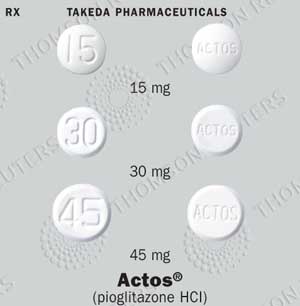Actos Type 2 Diabetes Treatment - Actos Patient Information
Brand Name: Actos
Generic Name: Pioglitazone Hydrochloride
Actos, pioglitazone hydrochloride, full prescribing information
Why is Actos prescribed?
Actos is used to control high blood sugar in type 2 diabetes. This form of the illness usually stems from the body's inability to make good use of insulin, the natural hormone that helps to transfer sugar out of the blood and into the cells, where it's converted to energy. Actos works by improving the body's response to its natural supply of insulin, rather than increasing its insulin output. Actos also reduces the production of unneeded sugar in the liver.
Actos (and the similar drug rosiglitazone maleate) can be used alone or in combination with insulin injections or other oral diabetes medications such as glipizide, glyburide,or metformin hydrochloride.
Most important fact about Actos
Always remember that Actos is an aid to, not a substitute for, good diet and exercise. Failure to follow a sound diet and exercise plan can lead to serious complications, such as dangerously high or low blood sugar levels. Remember, too, that Actos is not an oral form of insulin, and cannot be used in place of insulin.
How should you take Actos?
Actos should be taken once a day with or without meals.
- If you miss a dose...
Take it as soon as you remember. If you miss a dose on one day, skip it and go back to your regular schedule. Do not double your dose the following day. - Storage instructions...
Store at room temperature in a tight container, away from moisture and humidity.
What side effects may occur?
Side effects cannot be anticipated. If any develop or change in intensity, inform your doctor as soon as possible. Only your doctor can determine if it is safe for you to continue taking Actos.
- Side effects may include:
Headache, hypoglycemia, muscle aches, respiratory tract infection, sinus inflammation, sore throat, swelling, tooth disorder
Why should Actos not be prescribed?
If Actos gives you an allergic reaction, you should not take Actos.
Special warnings about Actos
In very rare cases, a drug similar to Actos has proven toxic to the liver. The manufacturer therefore recommends that your doctor check your liver function before you begin taking Actos and periodically thereafter. If you experience symptoms of liver problems such as jaundice (yellowing of the skin and eyes), nausea, vomiting, abdominal pain, fatigue, loss of appetite, or dark urine, report them to your doctor immediately. You will probably have to stop using Actos.
Because Actos works by improving the body's response to its own supply of insulin, it is not for type 1 diabetics, who are unable to produce any insulin at all. For the same reason, Actos can't be used to treat the condition known as diabetic ketoacidosis (excessively high sugar levels due to the lack of insulin).
In rare instances, Actos causes swelling and fluid retention that can lead to congestive heart failure. If you already have this problem, you should avoid Actos. If you develop symptoms that signal the problem—such as shortness of breath, fatigue, or weight gain—you should check with your doctor immediately; the drug will probably have to be discontinued. The problem is more likely when Actos is taken in combination with insulin.
Actos, by itself, will not cause excessively low blood sugar (hypoglycemia). However, when you combine it with insulin injections or some other oral diabetes drugs, the chance of hypoglycemia increases. If you begin to feel symptoms of hypoglycemia—shaking, sweating, agitation, clammy skin, or blurred vision—take some fast-acting sugar, such as 4 to 6 ounces of fruit juice. Let your doctor know about the incident; you may need a lower dose of insulin or oral medication.
To make sure that your blood sugar levels stay within the normal range, get regular tests of your blood sugar and glycosylated hemoglobin (a long-term measurement of blood sugar). Contact your doctor during periods of stress due to fever, infection, injury, surgery, and the like. Dosage of your diabetes medicines may need to be changed.
Possible food and drug interactions when taking Actos
It is possible that Actos may reduce the effectiveness of birth control pills containing ethinyl estradiol and norethindrone. To guard against an unwanted pregnancy, be sure to use some other form of contraception.
If Actos is taken with certain other drugs, the effects of either could be increased, decreased, or altered. It is especially important to check with your doctor before combining Actos with the following:
Ketoconazole
Midazolam
Special information if you are pregnant or breastfeeding
The effects of Actos during pregnancy have not been adequately studied. If you are pregnant or plan to become pregnant, tell your doctor immediately. He may switch you to insulin during your pregnancy, since normal blood sugar levels are very important for the developing baby.
It is not known whether Actos appears in breast milk. For safety's sake, do not use Actos while breastfeeding.
Recommended dosage for Actos
ADULTS
The recommended starting dose of Actos is 15 to 30 milligrams once a day.
If this fails to bring your blood sugar under control, the dose can be increased to a maximum of 45 milligrams a day. If your blood sugar still remains high, the doctor may add a second medication.
When Actos is added to other diabetes medications, your doctor may need to lower their dosage if you develop low blood sugar. If you are taking insulin, the dose should be lowered when blood sugar readings fall below 100.
Overdosage
The effects of a massive Actos overdose are unknown, but any medication taken in excess can have serious consequences. If you suspect an overdose with Actos, seek medical attention immediately.

Last Updated: 08/09
Actos, pioglitazone hydrochloride, full prescribing information
Detailed Info on Signs, Symptoms, Causes, Treatments of Diabetes
back to:Browse all Medications for Diabetes
APA Reference
Staff, H.
(2009, August 1). Actos Type 2 Diabetes Treatment - Actos Patient Information, HealthyPlace. Retrieved
on 2026, March 4 from https://www.healthyplace.com/diabetes/medications/actos-type-2-diabetes-control
